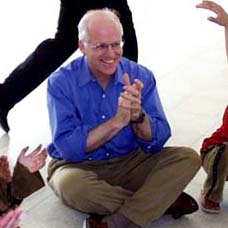
In U.S. culture, the best-known images of the 1950-53 Korean War are comedy scenes from the TV series M*A*S*H. In Korea, the war remains a vivid horror for many. The United States carpet-bombed the country with high explosives and a new weapon called napalm. "We burned down every town in North Korea and South Korea, too," Air Force Gen. Curtis LeMay recalled in a 1966 interview. Those memories have been reinforced by state mythology in the North and suppressed for decades by pro-U.S. dictatorships in the south. Only since 1999 have journalists and historians here and in the United States been exploring widespread accounts by Koreans of atrocities against civilians by U.S. and South Korean forces. Journalist James Rupert, head of Newsday's international bureau in Islamabad, Pakistan began his career abroad as a Peace Corps volunteer, teaching mechanics and welding in Morocco.
RPCV James Rupert writes: The crisis over North Korea's declared nuclear bomb test is the result of a long failure by U.S. and North Korean elites to understand each other
N. Korea misunderstood by U.S.
BY JAMES RUPERT
Newsday Staff Correspondent
October 14, 2006, 10:27 PM EDT
SEOUL, South Korea -- The crisis over North Korea's declared nuclear bomb test is the result of a long failure by U.S. and North Korean elites to understand each other, especially in the fevered air of the United States' global war on terror.
Last week's test, if apparently a nuclear fizzle, raises some long-term risk of an Asian atomic arms race. More worrisome for Washington is the possibility that North Korea, which has openly threatened to sell nuclear weapons, might happily accept some of Osama bin Laden's millions of dollars for one. In July, a leading scholar on nuclear risks, Harvard professor Graham Allison, called on the Bush administration to alert North Korea that it would regard any explosion of a nuclear weapon against a U.S. target as North Korean in origin, and make "a full retaliatory response."
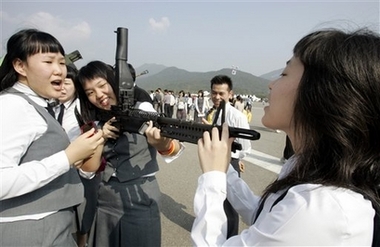
If the Bush administration misunderstood the nature of Iraq when it invaded three years ago, it may understand North Korea less. "The post-September 11 government in the United States and the isolated government in Pyongyang live on different planets and have no clue what the other wants," according to Michael Breen, a Seoul-based analyst and consultant who has written a biography of North Korean leader Kim Jong Il.
Caption: South Korean students play with a military machine gun (without ammunition) during the Defense Asia 2006 festival at the Army headquarters in Daejeon, south of Seoul, South Korea, Wednesday, Oct. 18, 2006. Satellite images indicate North Korea may be preparing a second nuclear test, officials said, as the U.S. secretary of state headed to Asia on Wednesday with warnings that the North's behavior could spark a regional atomic arms race. (AP Photo/ Lee Jin-man)
In Korean War's shadow
The ignorance that has become crisis is rooted in a war largely forgotten by Americans. In U.S. culture, the best-known images of the 1950-53 Korean War are comedy scenes from the TV series M*A*S*H. In Korea, the war remains a vivid horror for many.
The United States carpet-bombed the country with high explosives and a new weapon called napalm. "We burned down every town in North Korea and South Korea, too," Air Force Gen. Curtis LeMay recalled in a 1966 interview.
Those memories have been reinforced by state mythology in the North and suppressed for decades by pro-U.S. dictatorships in the south. Only since 1999 have journalists and historians here and in the United States been exploring widespread accounts by Koreans of atrocities against civilians by U.S. and South Korean forces.
After the first prominent such story, by The Associated Press, "I received numerous calls from old men and women who described to me one massacre after another that left me wondering: What kind of hell had these people gone through?" wrote reporter Choe Sang Hun, then with the AP.
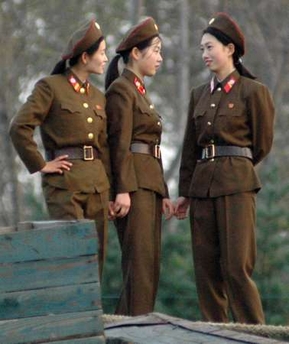
And from the start, Koreans' fears included a U.S. nuclear attack. At least 10,000 Koreans, mostly forced laborers, died in the U.S. atomic bombings of Japan's Hiroshima and Nagasaki, and survivors returned with horrific tales of the new American weapon. In later decades, as dictator Kim Il Sung built the North Korean state, he knew that Washington had seriously considered petitions by Gen. Douglas MacArthur for nuclear bombs to be dropped during the Korean War. He may not have known, as declassified U.S. documents now show, that MacArthur asked for as many as 38 of them.
Caption: North Korean soldiers chat on the bank of the Yalu River in the North Korean town of Sinuiju, October 18, 2006. U.S. Secretary of State Condoleezza Rice, saying she does not want to see the North Korean nuclear crisis escalate, is seeking ways to implement U.N. sanctions against the reclusive state in talks with Asian powers beginning on Wednesday. CHINA OUT NO ARCHIVES NO SALES REUTERS/Stringer (NORTH KOREA)
All of North Korea is built for the war the government regards as still under way. (A truce, but no peace treaty, has been signed.) Visitors and defectors describe bomb shelters and bunkers everywhere, in a land that still cannot feed itself.
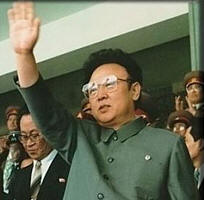
Kim Il Sung's son and successor, Kim Jong Il, is widely portrayed as a brutal, buffoonish playboy with bad hair. But scholars and other analysts say he shrewdly plays the equivalent of a weak poker hand. As he does, Korea's "nuclear policy provided a long-term insurance policy" against attack, Breen wrote in his Kim biography.
North Korea built two plutonium-producing nuclear power reactors in the 1980s. In 1993, it declared it would withdraw from the Nuclear Non-Proliferation Treaty, thus shrugging off international controls on its plutonium, which can power a bomb. The move forced the Clinton administration to open negotiations.
A year later, the two countries signed a deal: North Korea would shut its reactors and the United States would replace them with two light-water plants that do not produce bomb fuel. Washington also agreed to supply fuel oil and other economic help to the impoverished, energy-starved country. And both sides agreed to "move toward full normalization of political and economic relations."

President Bill Clinton pursued normalization, sending Secretary of State Madeleine Albright to Pyongyang in 2000. But Republicans condemned the policy as "appeasement," and the current administration abandoned diplomacy for blunt denunciation. In January 2002, President George W. Bush named North Korea, Iran and Iraq an "axis of evil" that threatened world peace by pursuing weapons of mass destruction.
Bush no fan of Kim
While the administration has not formally declared a policy of overthrowing Kim, Bush has openly signaled his desire to do just that. In his 2002 book, "Bush at War," journalist Bob Woodward described Bush "waving his finger in the air" and shouting, "I loathe Kim Jong Il! ... I've got a visceral reaction to this guy because he is starving his people ... They tell me we don't need to move too fast because financial burdens on people will be so immense if we try to -- if this guy were to topple. Who would take care of -- I just don't buy that."
But many scholars on Korea agree that Kim is no easy candidate for regime change. While he rules through naked oppression and fear, he and his father skillfully manipulated their people over decades to form a strong political machine alongside their massive army.
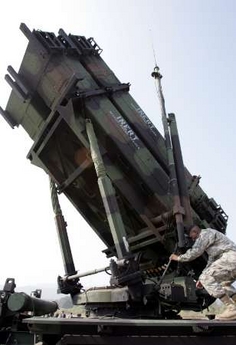
While the Western media commonly labels North Korea a Stalinist regime, in many ways it is a modernized version of the isolated, strictly Confucian, absolute monarchies that ruled from the 1300s until 1910 and first earned Korea the nickname "the hermit kingdom." Other than 35 years of Japanese colonial rule that ended in 1945, such kings were the only rulers Koreans knew.
Caption: A U.S. soldier checks a Patriot missile launcher displayed at the ground forces festival held by South Korean defence ministry at the headquarters of the armed forces in Taejon, about 200 km (125 miles) south of Seoul October 18, 2006. REUTERS/Lee Jae-Won (SOUTH KOREA)
In the fall of 2002, the Bush administration confronted Pyongyang with growing evidence that the North Koreans were trying an end run around the 1994 deal. That accord prevented Kim's government from trying to build a bomb with plutonium, but did not mention the other possible path -- using enriched uranium.
North Korea affirmed it was enriching uranium, and Washington declared the deal suspended, cutting off U.S. fuel oil supplies as winter set in. Within weeks, Pyongyang expelled the UN inspectors monitoring its plutonium stocks and, within seven months, was ready to begin reprocessing plutonium as bomb fuel.
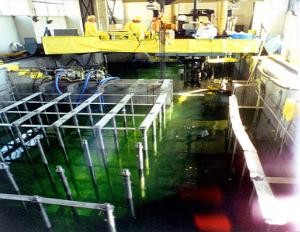
After the U.S. invasion of Iraq in March 2003, North Korea declared it needed a nuclear bomb to deter Washington from any similar assault. By midyear, it said it was ready to begin reprocessing plutonium as bomb fuel.
Caption: North Korea's cooling pond in Yongbyon for the temporary storage of about 8,000 spent fuel rods.
While the deal's collapse underscored Washington's pique at being deceived, it also freed Pyongyang to pursue what was seen a faster path to a nuclear test.
The Washington-based Nonproliferation Policy Education Center estimated that Korea was perhaps a year further away from beginning production of uranium bombs than plutonium ones.
The Bush administration has refused Pyongyang's request for direct, one-on-one talks, saying North Korea must halt its nuclear arms program before being accorded such status. But in a series of six-nation talks -- bringing in China, Russia, South Korea and Japan -- the United States and North Korea signed a vaguely worded accord in September 2005 that the North would halt all its nuclear weapons programs in exchange for the United States normalizing relations.
A White House divided
But the Bush administration was deeply divided about the deal, and both Washington and Pyongyang seemed ready to torpedo it. A day after the signing, North Korea demanded that the United States build it a light-water reactor -- something that had been offered in the accord only as a future possibility.
Three days after that, the United States imposed sanctions on bank accounts in Macao that served companies controlled by Kim's inner circle. The North Koreans "perceived this as a direct slap in the face at Kim, and a humiliation," said Bruce Cumings, a Korea specialist at the University of Chicago.
Within months, Pyongyang tried, with mixed results, to display new military muscles. On July 4, it tested a new missile that some specialists said might be capable of reaching the United States. But the rocket apparently failed shortly after launch, plunging into the sea off Korea's east coast.
Last week's underground explosion produced such an uncertain seismic signature that some foreign officials have questioned whether it was nuclear at all.










